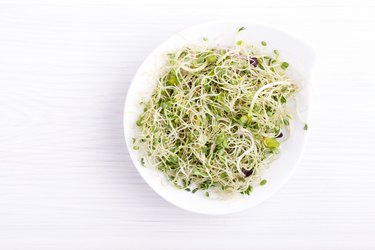
Bean sprouts are commonly used in salads, sandwiches, stir-fries and many other foods. These sprouts are seeds grown in water or very humid environments. Raw bean sprouts are safe to eat, but the warm, moist conditions they are typically grown in can increase bacterial growth. Children, the older adults, pregnant people and those with compromised immune systems may want to avoid eating bean sprouts, especially uncooked ones.
Tip
It is perfectly fine to eat bean sprouts raw, but they carry a higher than average risk of food-borne illness. Children, older adults, pregnant people and those with weak immune systems should avoid eating raw or lightly cooked bean sprouts.
Video of the Day
What Are Bean Sprouts?
There are a variety of bean sprouts commonly used in cooking, including adzuki, lentil, mung bean and soybean. There are also many other types of sprouts, like alfalfa sprouts and quinoa sprouts. However, these come from grains, nuts, seeds and vegetables. Regardless of their source, sprouts are all essentially young plants. They are grown in humid, wet environments or water.
Video of the Day
Read more: List of Sprouts to Eat
Are Bean Sprouts Nutritious?
Bean sprouts are very nutritious foods. Although their nutrition varies between types, sprouts are typically thought to be more nutritious than the unsprouted or fully grown versions of the same plants. Bean sprouts have an increased protein content and healthy antioxidants and fatty acids. They are also rich in fiber and contain several vitamins, including thiamin (vitamin B-1), folate (vitamin B-9) and vitamin C. Bean sprouts also contain quite a few minerals, including copper, iron, manganese and phosphorus.
People have eaten bean sprouts for thousands of years. They are not only nutritious but have been associated with various health benefits, including reduced risk of diseases. For instance, mung bean sprouts have been historically used in China to alleviate digestive system issues, heat stroke and swelling, as well as many other conditions. These beans are thought to have anti-inflammatory and antimicrobial effects, as well as help prevent many types of cardiac issues and diabetes. Other types of bean sprouts, like cow peas and soybean sprouts, are similarly high in nutrients and health benefits. The many benefits of sprouts like these make them healthy plants that can easily be integrated into a number of meals.
Eating Raw Bean Sprouts
There are many ways to eat bean sprouts. You'll find them included raw in many types of salads, sandwiches and wraps. Raw sprouts must be washed prior to use, like all fruits and vegetables. However, washing doesn't entirely remove bacteria from sprouts. In fact, raw and lightly cooked sprouts have been linked to many cases of food poisoning caused by bacteria like E. coli and salmonella. Other bacteria, such as staphylococcus and listeria, have also been associated with sprout-related cases of food poisoning. Bacteria like these are more likely to be found in sprouts than other plants because of how they're grown.
The high risk of bacterial contamination makes eating raw sprouts unsuitable for some. Certain groups should avoid eating uncooked or lightly cooked bean sprouts. Even outside of these risk groups, the FDA recommends cooking sprouts thoroughly to reduce the risk of food-related illnesses. Fortunately, it is possible to integrate cooked sprouts into many foods, like curries, stews and crispy stir-fries. Sprouts are also used to create tofu or high-protein alternative meat products. Bean sprouts have been traditionally used in many Asian cuisines, particularly Chinese, Indian and Korean dishes. They are also becoming increasingly popular in Brazilian foods.
- "Revisita de Nutricao"; Total Phenolics and Antioxidant Activity of the Aqueous Extract of Mung Bean Sprout ; Vera Lucia Arroxelas Galvao de Lima, et al.; 2004
- FoodSafety.gov: Sprouts: What You Should Know
- NHS: Eat Well: Sprouted seeds safety advice
- Nutrition Data: Lentils, Raw, Sprouted
- LWT - Food Science and Technology: Impact of germination on flour, protein and starch characteristics of lentil (Lens culinari) and horsegram (Macrotyloma uniflorum L.) lines
- Food Research International: Glycine max (L.) Merr., Vigna radiata L. and Medicago sativa L. sprouts: A natural source of bioactive compounds
- Chemistry Central Journal: A review of phytochemistry, metabolite changes, and medicinal uses of the common food mung bean and its sprouts (Vigna radiata).
- Current pharmaceutical design: Total polyphenols and bioactivity of seeds and sprouts in several legumes.
- U.S. Food and Drug Administration: Sprout Safety: Letter to Seed Suppliers, Distributors, and Sprouters